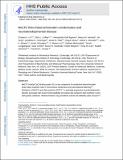MeCP2 links heterochromatin condensates and neurodevelopmental disease
Author(s)
Li, Charles H; Coffey, Eliot L; Dall’Agnese, Alessandra; Hannett, Nancy M; Tang, Xin; Henninger, Jonathan E; Platt, Jesse M; Oksuz, Ozgur; Zamudio, Alicia V; Afeyan, Lena K; Schuijers, Jurian; Liu, X Shawn; Markoulaki, Styliani; Lungjangwa, Tenzin; LeRoy, Gary; Svoboda, Devon S; Wogram, Emile; Lee, Tong Ihn; Jaenisch, Rudolf; Young, Richard A; ... Show more Show less
DownloadAccepted version (3.525Mb)
Publisher Policy
Publisher Policy
Article is made available in accordance with the publisher's policy and may be subject to US copyright law. Please refer to the publisher's site for terms of use.
Terms of use
Metadata
Show full item recordAbstract
© 2020, The Author(s), under exclusive licence to Springer Nature Limited. Methyl CpG binding protein 2 (MeCP2) is a key component of constitutive heterochromatin, which is crucial for chromosome maintenance and transcriptional silencing1–3. Mutations in the MECP2 gene cause the progressive neurodevelopmental disorder Rett syndrome3–5, which is associated with severe mental disability and autism-like symptoms that affect girls during early childhood. Although previously thought to be a dense and relatively static structure1,2, heterochromatin is now understood to exhibit properties consistent with a liquid-like condensate6,7. Here we show that MeCP2 is a dynamic component of heterochromatin condensates in cells, and is stimulated by DNA to form liquid-like condensates. MeCP2 contains several domains that contribute to the formation of condensates, and mutations in MECP2 that lead to Rett syndrome disrupt the ability of MeCP2 to form condensates. Condensates formed by MeCP2 selectively incorporate and concentrate heterochromatin cofactors rather than components of euchromatic transcriptionally active condensates. We propose that MeCP2 enhances the separation of heterochromatin and euchromatin through its condensate partitioning properties, and that disruption of condensates may be a common consequence of mutations in MeCP2 that cause Rett syndrome.
Date issued
2020Department
Massachusetts Institute of Technology. Department of Biology; Whitehead Institute for Biomedical ResearchJournal
Nature
Publisher
Springer Science and Business Media LLC